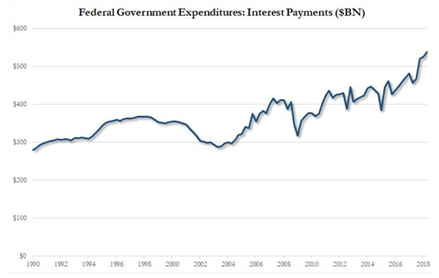I’ve started paying closer attention to interest rates.
The motivation: my trusty mortgage ARM — which hovered around 3% for a decade or so — jumped to 4% last year and is being reset to 5% this year.
Ouch.
==============
That got me wondering about the the impact of rising rates on the Federal budget…
=============
The obvious answer: a HUGE hit.
The Feds are already obligated to about $450 billion annually in interest to ‘service the debt’’.
That’s about 10% of the total Federal budget.
Everybody knows that budget deficits are high and growing … so the national debt has grown to over $20 trillion.
With interest rates near zero, the required interest payments were contained.
But, as interest rates move up … and spending continues unabated … it’s simple arithmetic that interest on the debt will increase at a fast pace.
Current projections have debt service on track to surpass a half trillion dollars this year or nest year.
The implication: a big budget squeeze on other spending … think social programs and defense … or higher taxes (ouch) … or, induced inflation to devalue the debt.
Why isn’t there more chatter about the impact of these rising rates?
==============
Follow on Twitter @KenHoma
#HomaFiles


August 14, 2018 at 11:36 am |
You’re missing a decimal: $450B of debt service represents 10.5% of the total budget. Spending is expected to be $4T with revenue of $3.6T (meaning a deficit of $440B in fiscal year 2018). At 1.5% interest expense relative to the entire budget would mean that our current budget is $30T, which is definitely not the case. But your point is well taken: every incremental dollar we add to the deficit at a higher rate of interest equates to a much higher cost of borrowing. If our total current debt was at the current roughly 3% interest rate, you could erase another $150B ($600B vs. $450B) from the budget to pay interest on the debt or seek other ways to balance (higher taxes, VAT, fees, cut services, etc.). A day of reckoning is coming. Good news is that our debt:GDP ratio is still better than most developed nations, so the aggregate number is high but our ability to pay it is also strong; it will depend on whether we can keep strong GDP growth after the last anemic few years while also keeping the economy from overheating and creating an inflationary cycle .
August 14, 2018 at 5:10 pm |
Sadly. Candidates talk about this, then get elected, stop talking about and exacerbate the issue.